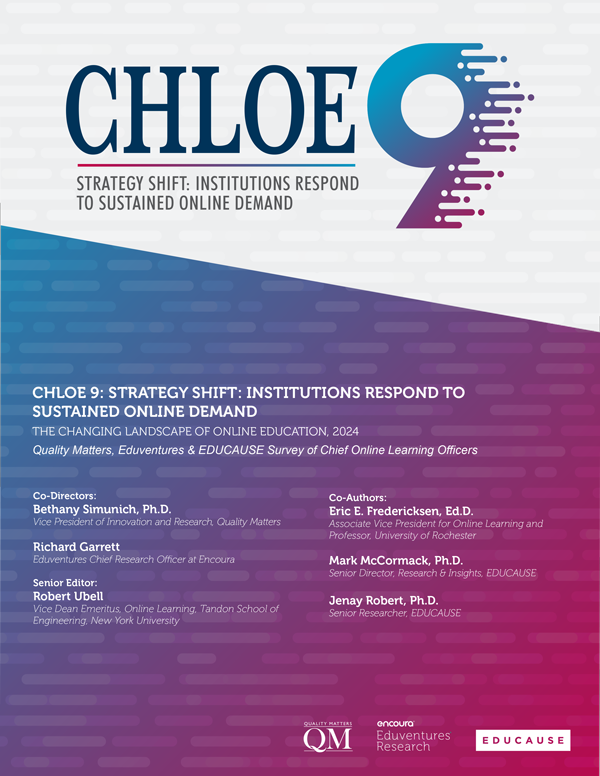CHLOE 9 | Strategy Shift: Institutions Respond to Sustained Online Demand

The ninth installment of the Changing Landscape of Online Education (CHLOE) report, produced by Quality MattersTM , Eduventures® and Educause — offers an overview of the current state of online learning in higher education as well as insights into its future development. The report was compiled by surveying chief online officers (COLOs) — the professionals best situated to assess the current state of this ever-developing field — at U.S. two- and four-year colleges and universities.
The majority of survey participants report both learner demand for online learning surging and institutional strategic priorities shifting to meet this demand, as well as the adaptation to the new presence of AI tools in the academic environment. Notable findings from the 53-page report include:
- Priorities for Online Learning: Institutions are increasingly prioritizing the development of online versions of both on-campus courses (69%) and on-campus degrees (65%) in order to meet demand. In terms of their topmost priority, 43% of COLOs chose online versions of on-campus degrees (the majority of public four-year institutions identified this as their top priority), with online versions of on-campus courses selected as the top priority by 39%.
- Tuition and Institutional Revenue: In an era when many institutions are experiencing financial challenges, most COLOs surveyed reported that their institutions charge the same tuition for online learning as they do for traditional face-to-face learning. With 60% of four-year public institutions reporting that they generate net revenue from these programs, the data points toward a high degree of financial viability for online learning. As a result, many institutions are investing more deeply in their online programs: 42% of COLOs reported at least some increase in their online learning budget.
- AI in Higher Education: With artificial intelligence a constant topic of discussion in education, COLOs reported a wide variety of approaches for addressing its presence and potential in higher learning. Only 35% of COLOs reported having AI-related policies; 40% reported that policies and guidelines related to AI were topics under discussion. 34% of COLOs reported that students are encouraged to engineer AI prompts in their classes, and 32% of COLOs say that AI as a topic is taught to students. Only 6% of COLOs said students are actively discouraged from using AI.
- Third-Party Servicers: In early 2023, the U.S. Department of Education announced new accountability measures for Third-Party Servicers — corporate entities that partner with colleges to help them develop or deliver some aspect of their operations — including Online Program Management companies (OPMs). These measures greatly expanded both the definition of this category and the actions institutions must take in order to utilize Third-Party Servicers, raising concerns about the time and cost needed to comply. In CHLOE 9, about a quarter of COLOs reported that their institution currently works with at least one OPM, an increase from the 18% who said the same in CHLOE 7 (2022). This suggests that OPM adoption by institutions invested in online learning is still growing. Just over half of respondents revealed moderate or little concern about newly proposed federal regulations targeting OPMs and other online learning activities, suggesting widespread uncertainty about whether proposed new rules will ever take effect.
- Regular and Substantive Interaction: In order for online courses to qualify for federal student aid, the U.S. Department of Education requires Regular and Substantive Interaction (RSI) to occur. This requirement mandates frequent and meaningful interactions between students and instructors in both synchronous and asynchronous programs. In CHLOE 9, only a small minority (7%) of schools report not having (or considering) RSI policies or guidelines, with public institutions more likely to have them than private institutions. The majority of institutions provide faculty support in meeting RSI by providing staff help, training, and/or digital resources, but nearly one-quarter do not evaluate any courses to determine if RSI requirements have actually been met.
If you are a COLO and wish to participate in a CHLOE Survey, or if you wish to nominate the COLO at your institution for inclusion, please sign up to participate in future surveys.
